At the inaugural MarTech Conference last year, Sheldon Monteiro, the global CTO of SapientNitro, led a research study of the attendees — as well as readers of this blog — to profile the charateristics of marketing technologists as an emerging profession.
The results were fascinating, revealing incredible depth and diversity of the backgrounds and skill sets under the “marketing technologist” umbrella. As shown above — and reported in an infographic that was released last year — half of the participants skewed more heavily to the marketing side of the spectrum (52%), and the other half skewed towards technology (48%).
Sheldon and his analytics team, including SapientNitro research pros Hilding Anderson and Scott Tang, further identified six archetypes — three skewed towards marketing and three skewed towards technology:
- Marketing Mavens (26%): With marketing skills emphasized over technology, Mavens specialize in building marketing programs using expertise in marketing strategy, strategic positioning, and promotion.
- Content Curators (16%): Storytellers. Message crafters. Marketing strategists. Content management platform experts. This type exercises consider knowledge of content marketing and related technologies to direct communications-oriented marketing.
- Media & Marketing Analyzers (10%): Specialize in research, consumer insights, and strategic planning. They think strategically about segmentation and connections planning.
- Data Divas (17%): Divas are skilled in marketing operations management, CRM, data science, analytics, and modeling. They know how to acquire integrate and make data perform.
- Infrastructure Architects (16%): Enterprise-level technology chops define this archetype, but they are also business consultants and bring a high-level understanding of a company’s marketing initiatives.
- Experience Engineers (15%): One foot in technology and another in experience. They are experts in cutting-edge technology, from e-commerce to front-end technology and mobility.
(Bonus points for the awesome application of alliteration in articulating these archetypes.)
Sheldon, Hilding, and Scott recently released a full report on this data, Analyzing the Chief Marketing Technologist, which is free to download. It’s a terrific read, offering their perspective on what these different archetypes mean for companies who are looking to hire and develop such talent. For example, here’s one excerpt from the report:
One immediate implication for brands looking to appoint a [chief marketing technologist] — they must be more specific in creating a job description — the term “marketing technologist” simply is insufficient. Lacking specifics when casting the role will increase the odds of professional failure. For instance, recruiting a Marketing Maven when the job situation calls for a Data Diva or Infrastructure Architect will require additional senior team members with complementary skills to build out a capable marketing technology function.
We recommend an outline of the specific skills required, followed by a determination of which primary, and secondary (or more, if needed) archetype fits best. Brands with stable business models should be able to define their needs succinctly e.g. evolve and manage the marketing automation infrastructure. By doing so, they will be able to focus on the archetypes required, which will increase the likelihood of finding experienced candidates who can fill the role effectively. Of course, employers concerned about changing consumer behavior or digital disruption to their core business will need a “unicorn” with breadth and depth across multiple, or all archetypes to lead the marketing technology office. In this case, expect the candidate pool to be much smaller, and the search to take longer.
One section of the report that I found particularly interesting was how marketing-oriented vs. technology-oriented marketing technologists self-identify the charactertistics of their role:
The majority of marketing technologists identify with “business consultant,” “jack of all trades” and “manager” roles. The differences are primarily that marketing-centric folks, naturally, see themselves more as “marketing experts,” and technology-centric folks see themselves more as “system integrators” and “IT specialists.”
However, when it comes to personality, note that the two group align almost perfectly:
Both groups have a high percentage who see themselves as “innovative, creative” and “logical, analytical.” This counters the classic stereotypes of marketers being creative and technologists being analytical. We have analytical marketers and creative technologists. More importantly, marketing technologists dispel the myth that you have to be just one or the other — many are both.
What archetypes do you most relate to? If you could invent a new archetype that would best describe you, what would it be?
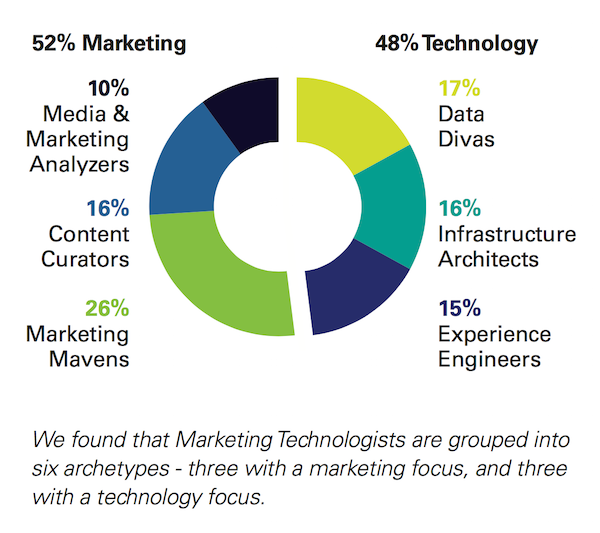
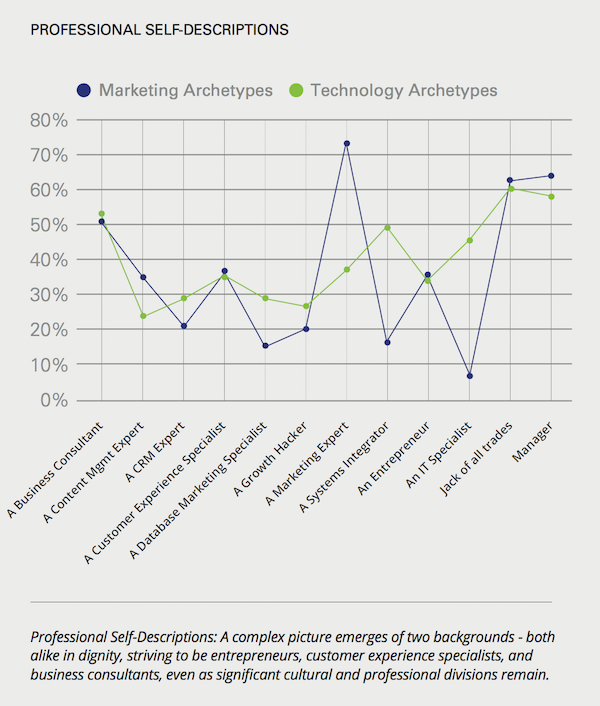
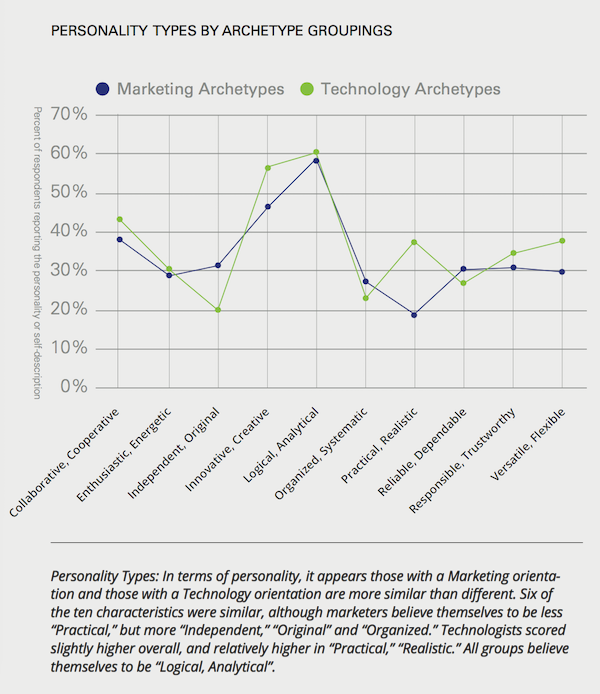
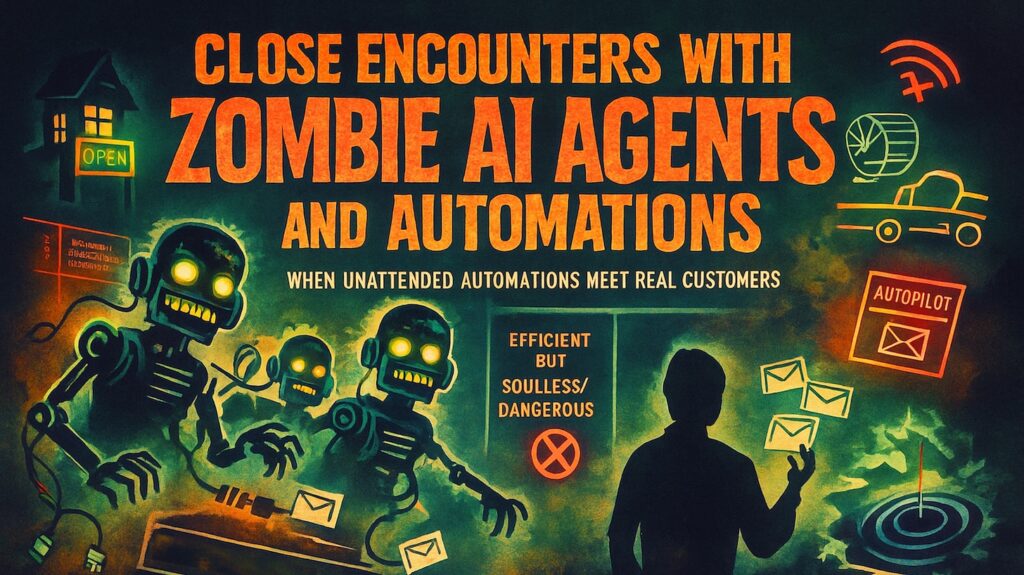

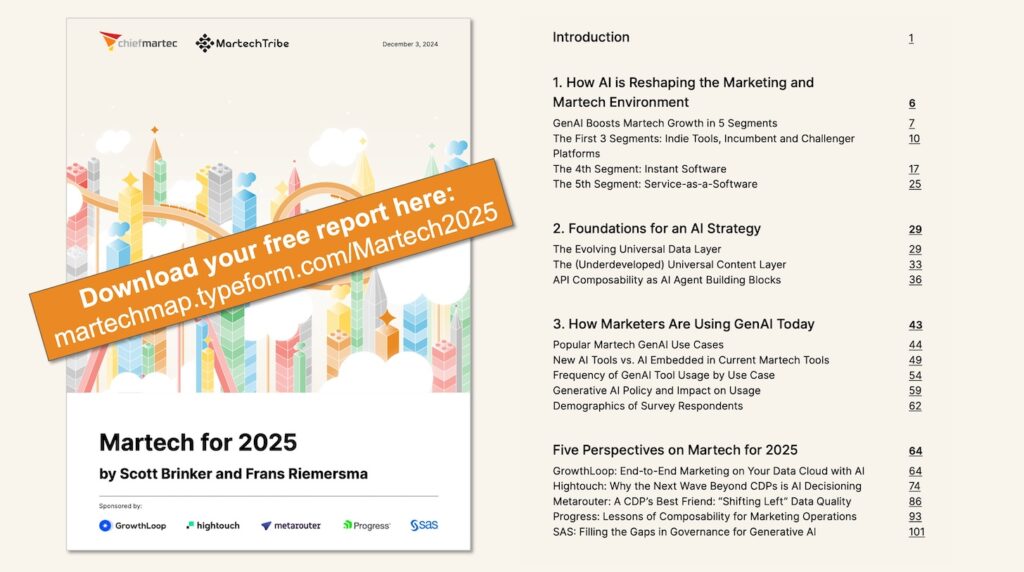
The separation at “practical, realistic” as compared to “entrepreneur” on the previous chart, if statistically valid, intrigues me. Can these groups remain or become the needed agents of change necessary to re-tool marketing for substantive (rather than incremental) impact?
That is a very good question…in addition, might it be the melding of these two types where marketers are now required to be both technologically savvy and creative. In other words, be an expert on both sides of the fence. Is that even possible? Possible, yet rare.